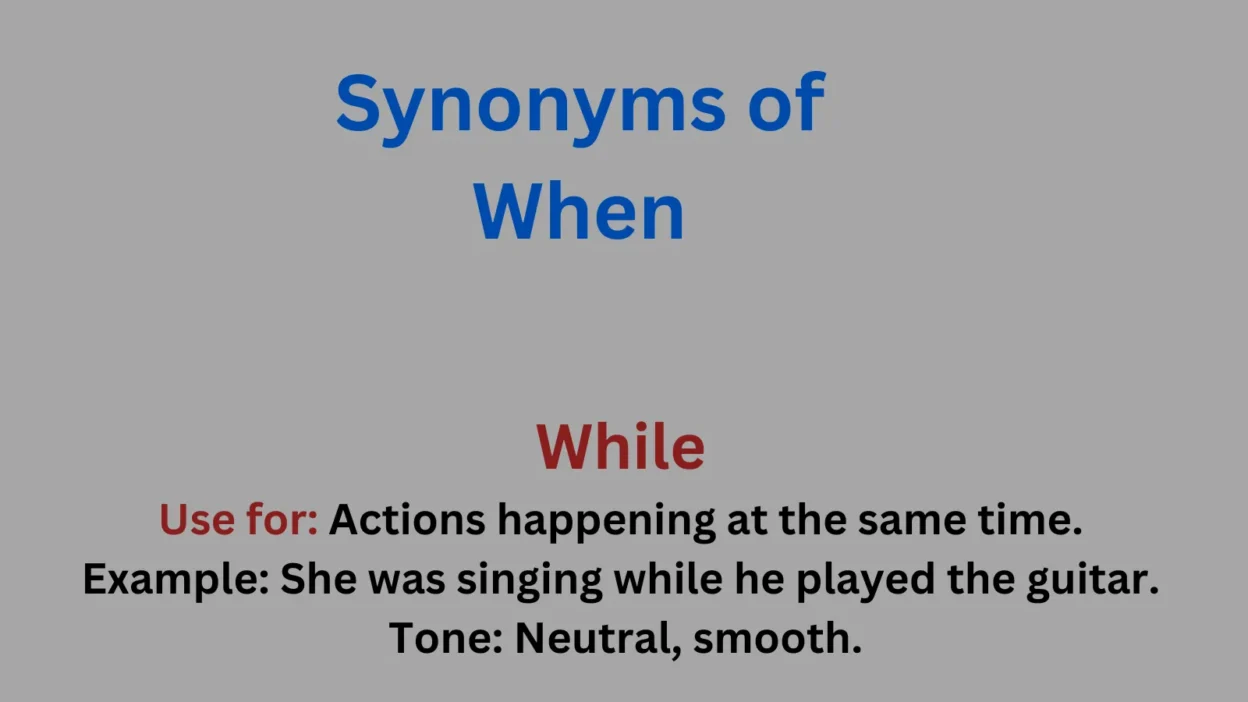Synonyms of when help express time, condition, or circumstance, such as while, as soon as, or once. For example: Call me when you arrive at the airport. Using the right synonym lets you describe timing, sequences, or triggers in a sentence more precisely. Each word or phrase adjusts the flow and meaning of events slightly.
If you’re crafting narratives, instructions, or everyday conversations, choosing accurate synonyms for when helps your writing feel natural and clear.
In this article, you’ll get the meaning and example sentence for each synonym of when, so you can master time-based expressions with ease. Ready to explore time-tested alternatives for when? Let’s jump in!
What Does “When” Really Mean?
At first glance, when might seem like a plain, practical word—just a way to ask about time. But this small word holds big power. It connects events, sets conditions, and helps us understand sequences. Depending on the context, it can express:
- Timing: When did that happen?
- Conditions: When you’re ready, we’ll go.
- Cause and effect: When it rains, the streets flood.
Though when isn’t a word we’d call emotional or shy in tone, it can be gentle and reserved in how it transitions ideas. In writing, synonyms of when can subtly shape the mood—formal or casual, direct or poetic. That’s why learning its alternatives can sharpen your writing style.
30 Alternatives to “When” and How to Use Them
1. While
Use for: Actions happening at the same time.
Example: She was singing while he played the guitar.
Tone: Neutral, smooth.
2. As
Use for: Simultaneous or causal events.
Example: As the sun set, the sky turned pink.
Tone: Slightly poetic or literary.
3. Whenever
Use for: Repeated or habitual actions.
Example: Whenever I see her, I smile.
Tone: Flexible, friendly.
4. Once
Use for: A point in time that begins something.
Example: Once he arrived, the meeting started.
Tone: Narrative, often in storytelling.
5. After
Use for: Events following another.
Example: We ate dinner after the movie.
Tone: Straightforward, neutral.
6. Before
Use for: Events happening earlier.
Example: Brush your teeth before bed.
Tone: Clear, instructional.
7. Since
Use for: Starting points in time or reasons.
Example: I’ve been tired since I woke up.
Tone: Casual or explanatory.
8. Until
Use for: Events continuing up to a point.
Example: Wait until I finish talking.
Tone: Slightly commanding or structured.
9. As soon as
Use for: Immediate sequences.
Example: Call me as soon as you land.
Tone: Urgent or prompt.
10. The moment
Use for: Precise time or strong emotion.
Example: The moment she walked in, everyone stared.
Tone: Dramatic or intense.
11. By the time
Use for: Anticipated past or future time.
Example: By the time you arrive, it’ll be dark.
Tone: Planning-oriented.
12. In case
Use for: Conditional or precautionary actions.
Example: Take an umbrella in case it rains.
Tone: Careful or thoughtful.
13. In the event that
Use for: Formal conditional statements.
Example: If she resigns, we’ll need a replacement.
Tone: Professional, formal.
14. Upon
Use for: Immediate consequence.
Example: Upon arrival, please check in.
Tone: Formal or official.
15. During
Use for: Periods.
Example: No phones during class.
Tone: Direct, rule-based.
16. When suddenly
Use for: Unexpected events in stories.
Example: She was walking peacefully when suddenly the lights went out.
Tone: Suspenseful.
17. At the time
Use for: Specific moments, often in the past.
Example: At the time, I didn’t know what to say.
Tone: Reflective, thoughtful.
18. Once upon a time
Use for: Fairy tales or storytelling.
Example: Once upon a time, there lived a dragon.
Tone: Classic, nostalgic.
19. Eventually
Use for: Delayed outcomes.
Example: Eventually, he apologized.
Tone: Patient, forward-looking.
20. Soon after
Use for: Events closely following others.
Example: Soon after the party started, it began to rain.
Tone: Narrative.
21. Now that
Use for: Conditions that have just changed.
Example: Now that you’re here, let’s begin.
Tone: Current and casual.
22. As long as
Use for: Time-limited conditions.
Example: You can stay as long as you like.
Tone: Reassuring or generous.
23. Every time
Use for: Recurring moments.
Example: Every time it snows, she gets excited.
Tone: Routine, emotional.
24. Just as
Use for: Precise timing or similarity.
Example: Just as I sat down, the phone rang.
Tone: Balanced, timing-focused.
25. Immediately after
Use for: Instant succession.
Example: Immediately after the speech, the crowd clapped.
Tone: Emphatic.
26. Following
Use for: Chronological clarity.
Example: Following the announcement, stocks dropped.
Tone: Analytical, news-like.
27. The instant
Use for: High urgency.
Example: The instant she heard the news, she called home.
Tone: Dramatic, fast-paced.
28. In the meantime
Use for: Transition periods.
Example: Dinner’s in an hour; in the meantime, relax.
Tone: Casual, time-filler.
29. At the same time
Use for: Parallel actions.
Example: They both spoke at the same time.
Tone: Neutral, literal.
30. No sooner than
Use for: Very close time events, often in writing.
Example: No sooner had she left than he called.
Tone: Formal, literary.
Choosing the Right Synonym: Tone, Emotion, and Context
When selecting a synonym for when, ask yourself:
- Is the timing immediate or stretched? Use immediately after for urgency, eventually for delay.
- Is this casual or formal writing? Choose upon or if for formal; go with as soon as or once for casual.
- Do you want to sound poetic or precise? Try as or just as for a softer tone; after or following for sharper clarity.
- Is it part of a story or a fact? Narrative phrases like the moment, soon after, or once upon a time add storytelling flair.
Cultural and Emotional Touchpoints
- In business writing, if or upon reads more professionally.
- In romantic or dramatic storytelling, the moment or the instant evokes strong emotions.
- In everyday speech, once or when works just fine—no need to sound robotic.
Conclusion: Mastering the Use of “When” and Its Alternatives
Choosing the right synonym of When, can help you refine your sentence structure, improve clarity, and adapt your tone for different writing styles. Whether you use as soon as, while, once, or another alternative, each word carries subtle differences in meaning and timing.
This article has given you 30 thoughtful options, complete with definitions, examples, and usage tips to help you express time and sequence more precisely.
As your vocabulary grows, so does your ability to communicate with nuance and accuracy. The next time you’re about to write “when,” you’ll have a variety of strong, suitable alternatives ready to use.




